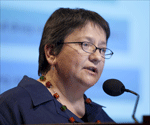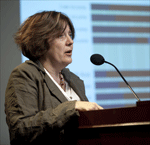-
Maintaining the Momentum: Highlights From the Uganda International Conference on Family Planning
›“Family planning is to maternal survival what a vaccination is to child survival,” said Johns Hopkins professor Amy Tsui, quoting Khama Rogo of the World Bank, at the Woodrow Wilson Center event Maintaining the Momentum: Highlights From the Uganda International Conference on Family Planning on March 16. Rogo made the strong statement during the landmark November 2009 conference in Kampala, which has renewed interest in family planning and reproductive health among African leaders and development partners. Rhonda Smith of the Population Reference Bureau and Sahlu Haile of the David and Lucile Packard Foundation joined Tsui, the director of The Bill & Melinda Gates Institute of Population & Reproductive Health, to discuss their impressions of the Kampala conference and what it means for the future of family planning in Africa.
“An event that happened at the right time”
“Kampala was the work of a community,” said Tsui. More than 50 organizations—the U.S. Agency for International Development, the UN Population Fund, the World Bank, the World Health Organization, and the Gates and Packard Foundations—convened in Uganda, which was chosen not only for its central location, but also to highlight the country’s soaring unmet need for contraception—41 per cent—and rapid 3.1 percent population growth rate.
Panels focused on key issues in family planning, including:- Integrating family planning into HIV/AIDS care
- Integrating family planning in post-abortion, postpartum, child, and other primary health care
- Expanding contraception delivery services by community health workers
- Increasing outreach to youth and men
- Capitalizing on private and public innovations in service delivery and financing
- The United States announced its foreign assistance budget will increase support for family planning from $450 million to $715 million for the next fiscal year.
- The Global Health Initiative identified maternal/child health and family planning as one of its main priority themes.
- Secretary of State Clinton positively discussed girls’ education, family planning, and reproductive health at the ICPD + 15 anniversary.
- The Women Deliver 2010 Conference, to be held in June, has identified family planning as a third pillar of maternal health.
Uganda on the Move Rhonda Smith’s presentation “Uganda on the Move”—which she also presented in Uganda—is a prototype of the Population Reference Bureau’s new ENGAGE (Eliminating National Gaps—Advancing Global Equity) project, which is designed to “engage policy audiences and promote policy dialogue around issues of high fertility and high unmet need for family planning and their costs, consequences, and solutions,” she said. By using stunning, innovative graphics and avoiding confounding technical terms, ENGAGE’s products are designed to reach non-technical policy audiences and influential decision-makers.
Rhonda Smith’s presentation “Uganda on the Move”—which she also presented in Uganda—is a prototype of the Population Reference Bureau’s new ENGAGE (Eliminating National Gaps—Advancing Global Equity) project, which is designed to “engage policy audiences and promote policy dialogue around issues of high fertility and high unmet need for family planning and their costs, consequences, and solutions,” she said. By using stunning, innovative graphics and avoiding confounding technical terms, ENGAGE’s products are designed to reach non-technical policy audiences and influential decision-makers.
As one of the Uganda conference’s most talked about presentations, “Uganda on the Move” wows audiences with visuals created using Hans Rosling’s Trendalyzer software. The presentation shows that although Ugandans are increasingly healthier, have a higher life expectancy, and are more educated, maternal health remains in jeopardy. Tellingly, 46 percent of pregnancies in the country are unplanned, 6,000 women die each year from complications related to pregnancy, and 1,200 women die each year from undergoing unsafe abortions.
Maternal deaths, however, do not tell the whole story: For every one woman dying, Smith said, 20-30 women suffer from short-term disability, which places a major strain on economic growth. From 2004 to 2013, maternal death will cost Uganda US$350 million in lost productivity; and disability will cost and additional US$750 million.
What Next? The African Perspective “After 10 years of virtual clandestine work, [family planning] is just coming out of the closet,” said Sahlu Haile. Over the last few decades, family planning advocates have been struggling to: 1) keep family planning alive—without it being affected by political considerations 2) make family planning a health priority, without any associations with rights violations; and 3) be in solidarity with pioneering organizations of the family planning movement, like the International Planned Parenthood Federation, that were victims of discriminatory funding decisions.
“After 10 years of virtual clandestine work, [family planning] is just coming out of the closet,” said Sahlu Haile. Over the last few decades, family planning advocates have been struggling to: 1) keep family planning alive—without it being affected by political considerations 2) make family planning a health priority, without any associations with rights violations; and 3) be in solidarity with pioneering organizations of the family planning movement, like the International Planned Parenthood Federation, that were victims of discriminatory funding decisions.
The Uganda conference changed all that, said Haile. In Uganda, conference attendees were “talking about family planning…not reproductive health, not maternal/child health.” This, he said, was “probably the single most important lesson…that I took from the Kampala conference.”
Following the conference, Haile said that African government officials stressed family planning as a priority at meetings in Ethiopia and Nigeria—the first time he had witnessed such high-level attention to family planning from those countries in his 30-year career.
In Ethiopia, African leaders pledged to:- Prioritize family planning, since family planning is one of the most cost-effective development investments;
- Ensure access to contraception, as 40 percent of maternal deaths are associated with unwanted pregnancies; and
- Integrate MDG 5b, universal access to reproductive health, into their international development plans and budgets.
Haile credited the Kampala conference for spurring these efforts. In December, he joined a task force of 14 Ethiopian organizations to plan the next steps. They will jointly develop research capacities, generate evidence, and strengthen monitoring and evaluation practices, especially with regard to integrating population, health, and environment efforts. In addition, they will engage with wider audiences via new tools such as the blog RH RealityCheck and Gapminder Foundation’s Trendalyzer program.
Haile believes we need to “work together to encourage national-level efforts…to make sure family planning stays where it is now and make sure it is not abandoned.”
To be a part of the new online family planning community, join the Kampala Conversation.
Photo 1: A women and her children in Jinja, Uganda. Courtesy Flickr user cyclopsr. Photos of Amy Tsui, Rhonda Smith, and Sahlu Haile courtesy of Dave Hawxhurst, Woodrow Wilson Center. -
Demographic Trends
›Worldfocus recently featured two pieces on the Arab world’s burgeoning population. “Demographics of the Arab World,” a radio broadcast, brings together Magda Abu-Fadil of the American University in Beirut and Bernard Haykel of Princeton University for a look at the region’s demographic trends. Despite possessing different political systems and being at different levels of economic development, demographic challenges of youth bulges, emigration, and gender gaps are common to countries across the Arab world. “Arab World Experiences Rapid Population Explosion,” a written interview with demographer Patrick Gerland of the United Nations Population Division, tackles similar issues. Topics of discussion include demographic variations between Middle Eastern nations, fertility rates, the consequences of the region’s youth bulge, and best- and worst-case scenarios for the Arab world’s future.
State of the World’s Cities 2010/2011: Bridging the Urban Divide is the most recent edition of UN-HABITAT’s biennial outlook into global population centers. Analyzing the “the complex social, political, economic, and cultural dynamics of urban environments,” the report explores the “ways in which many urban dwellers are excluded from the advantages of city life.” UN Secretary General Ban Ki-Moon draws a connection between cities and climate change in the report’s preface, writing, “With over half the world’s population now living in cities, and cities making a disproportionate contribution to climate change, urbanization is one of the ‘crucial agendas’ of our time.” -
‘Wilson Center on the Hill:’ Haiti’s Long Road Ahead
›March 25, 2010 // By Wilson Center StaffNearly two months after the devastating 7.0 magnitude earthquake in Port-au Prince, Haiti, the country still needs assistance to provide basic healthcare and shelter, in addition to rebuilding Haiti’s economy, government, and institutions. As the international community and NGOs make the transition from emergency disaster relief to long-term reconstruction and capacity-building efforts, donor coordination and long-term commitment are crucial. Recently, on Capitol Hill, a panel of experts organized by Wilson Center on the Hill and the Wilson Center’s Latin American Program discussed Haiti’s continuing problems and challenges.
Patience Necessary
Johanna Mendelson Forman, a senior associate for the Americas Program at the Center for Strategic and International Studies, stressed that progress in Haiti will take time—perhaps five years to rebuild and 10 years to see positive economic growth. This timeline is often frustrating for donors—including Congress and U.S. citizens—who want to see immediate results, she noted. Nevertheless, Mendelson Forman discounted the myth that “because Haiti is a weak state it is not a sovereign state,” and emphasized that developing and strengthening the Haitian government remains necessary.
She observed that the post-earthquake efforts in Haiti have been different from previous United Nations interventions, particularly in terms of the Latin American community’s involvement. Brazil, for example, is leading relief operations. Other Latin American countries—including Haiti’s neighbor, the Dominican Republic—have committed to promoting a stable and secure Haiti. Here Mendelson Forman noted a new partnership initiated by the Dominican and Haitian governments. “[Dominican officials] understand that they are doomed if Haiti is doomed,” she said. “As members of the international community, it is our job to foster that reconciliation.”
Costs Are Rising
Andrew Philip Powell, a regional economic advisor in the Caribbean Country Department at the Inter-American Development Bank (IDB), said that while the IDB initially estimated damage from the earthquake at about $8 billion, the complete destruction of the government and commerce centered in Port-au-Prince could push that number much higher. The IDB and partner organizations are currently conducting a Post-Disaster Needs Assessment that will ultimately identify the official damages and ballpark the cost of reconstruction.
Powell stated that Haiti is “not starting from a blank slate,” citing a development strategy agreed upon in April 2009 by the Haitian government and international donors. In keeping with the strategy, he emphasized the need for effective coordination between donors and the Haitian government. At the same time, he said it is vital to encourage population dispersion by shifting government agencies and private-sector jobs to other parts of the country. Haiti needs roads and communication networks outside of the capital area, as well as export processing zones in outlying regions, to increase the economic opportunities outside of Port-au-Prince, he said.
However, with the large amounts of aid flowing into the country, Powell warned donors and Haitian officials to remain on the lookout for “Dutch disease”—a decline in the manufacturing sector following a sharp increase in natural resource prices, foreign assistance, or foreign direct investment. Its occurrence could increase Haiti’s dependency on aid in the future.
Challenges for Healthcare
Sheri Fink, a public policy scholar at the Woodrow Wilson Center and senior fellow at the Harvard Humanitarian Initiative, offered her perspective on Haiti’s continuing health crisis based on two trips to the country in the earthquake’s aftermath. There are signs of hope, including some normalcy and commerce returning to the camps, she noted, but problems in the health sector as a whole are increasing. As field hospitals put in place after the earthquake close, “there is a fear among Haitians that attention is starting to turn elsewhere,” she said.
According to Fink, “the work is far from done” in Haiti, a sentiment she said is shared by many departing health workers. The hospitals left standing are not prepared to deal with the influx of patients arriving at their doors following the closure of field hospitals, and government health workers are currently working without pay.
Fink also pointed out the risk of long-term earthquake-related health problems, including injuries suffered during aftershocks or from falling debris, inflamed chronic diseases, horrible conditions and lack of basic health services in camps, and the “looming nightmare” of infectious disease epidemics.
Fink called for more international involvement to avert a widening of the health crisis. “We’ve made a big commitment and to follow-up on the investment, to make it mean something; let’s not be satisfied with just bringing things back to where they were,” she said.
By Sarah Huston and David Klaus of Wilson Center on the Hill at the Woodrow Wilson International Center for Scholars.
Photo: Courtesy Flickr user United Nations Development Programme -
The Feed for Fresh News on Population
›March 25, 2010 // By Wilson Center StaffUSAID’s Gloria Steele offers written testimony on the FY2011 Global Health and Child Survival (GH CS) budget request before the House Appropriations Subcommittee on State, Foreign Operations
Andrew Revkin gives a shout-out to family planning and notes the lack of population discussion at Copenhagen in his blog post, “From Wishful Thinking to Real-World Action on Climate“
Video of Secretary of State Hilary Clinton addressing the Commission on the Status of Women in which she discusses the Global Health Initiative, maternal mortality, family planning, and “gendercide“
Family planning-environmental connections headline PATH‘s March edition of Outlook
Youth bulges and social conflict are noted in Nicholas Kristoff’s recent article on child marriages in Yemen
Follow Geoff Dabelko on Twitter for more population, health, environment, and security updates -
Energy Is a “Constraint on Our Deployed Forces”: DOD DOEPP Nominee Sharon Burke
›March 24, 2010 // By Wilson Center Staff“I believe right now that energy is a vulnerability and constraint on our deployed forces,” said Department of Defense nominee and CNAS Vice President Sharon Burke yesterday morning at her confirmation hearing before the Senate’s Armed Services Committee. She described the tremendous cost—in lives, capital, and operational flexibility—of meeting the current fuel needs of troops in Afghanistan. Leading DOD’s efforts to account for the “full cost and full burden of energy,” she said, will be one of her priorities if she is confirmed.
“The committee and Congress have shown an acute interest in operational energy by creating this position,” said Burke, who would be the first person to serve as Director of Operational Energy Plans and Programs (DOEPP). “Sharon Burke has a deep understanding of the energy and climate change challenges facing the Department of Defense,” according to Geoff Dabelko, director of the Wilson Center’s Environmental Change and Security Program. “She would be able to hit the ground running if confirmed.”
Burke said that previous Congressional and presidential mandates have pushed DOD to improve the energy posture of its domestic facilities. She hopes to achieve similar successes in the operational arena. While she was reluctant to privilege any single solution, she suggested that more efficient weapon platforms and tactical vehicles, alternative fuels, and better business and acquisition processes could all be part of the mixture.
In response to a question from Senator Chambliss (R-GA) about climate change, Burke said, “I think the Quadrennial Defense Review (QDR) does a very good job laying out the proper role of the military forces.” The Wilson Center recently hosted a panel discussion on the QDR and the UK Defence Green Paper, at which the speakers repeatedly referred to the future DOEPP.
The nomination hearing largely avoided any tension concerning climate science and mitigation policies, focusing instead on military operations and ensuring the maximum effectiveness of U.S. forces. “My top priority would be mission-effectiveness,” Burke said. E&E; News reports Burke is expected to be confirmed.
Photo: Sharon Burke courtesy CNAS. -
Is the Melting Arctic a Security Challenge or Crisis? The View From Russia and Washington
›March 24, 2010 // By Geoffrey D. DabelkoIn his opening remarks at the Security Council of the Russian Federation’s meeting on climate change last week, Russian President Dmitry Medvedev framed climate change as a force for increased competition and “disputes between countries.” Unsurprisingly, he focused on the Arctic region and what he called the “inadmissible” and “unfair” threats to Russia’s access to the region’s resources:
We must not forget either that climate change can give rise not only to physical change, change in the nature around us, but can also see the emergence of disputes between countries over energy exploration and extraction, the use of marine transport routes, bioresources, and shortages of water and food resources. The countries bordering the Arctic region are already actively engaged in expanding their research, economic, and even military presence in the Arctic. Unfortunately, in this situation, we are seeing attempts to limit Russia’s access to exploring and developing Arctic energy deposits, which is inadmissible from a legal point of view and unfair in terms of our country’s geographical location and very history.
His reference to “shortages of water and food resources” fits squarely within the increasingly common view of climate change’s potential as a “conflict accelerant” (see, e.g., the U.S. Department of Defense’s 2010 Quadrennial Defense Review) or “threat multiplier” (as in CNA’s National Security and the Threat of Climate Change and statements from representatives of the UK and EU foreign offices).
But his Arctic comments sounded different than what I’ve been hearing in Washington. The Arctic rightfully gets a lot of attention for alarming rates of physical change, newly accessible resources, and potential new shipping routes. Yet remarks at a recent spate of Arctic climate and security discussions suggest officials in Washington view the geopolitical and trade issues more as “challenges” than “crises.”
For example, last month at the Stimson Center, and just yesterday at the Johns Hopkins University Applied Physics Lab, the U.S. Navy’s director of Task Force Climate Change and oceanographer, Rear Admiral David Titley, used “challenge” rather than “crisis” to depict the security situation in the far North. At numerous panels, officials and experts expressed confidence that the Arctic Council and related institutions are forums robust enough to manage current and future disputes.
Ironically, one of those key institutions is UNCLOS, the Law of the Sea treaty, which has been ratified by 157 countries, but not the United States. U.S. military and civilian officials alike see ratification as a key step for the United States to represent its interests in these critical multilateral settings. Nevertheless, we can anticipate some knee-jerk demagoguery about the treaty ceding U.S. sovereignty to the United Nations, so the Senate is unlikely to take up the issue until after the fall 2010 elections.
I want to thank friend and colleague Alexander Carius, co-director of Adelphi Research, for calling President Medvedev’s speech to my attention.
Photo: Russian President Dmitry Medvedev, courtesy Flick user World Economic Forum -
Tapping In: ‘Secretary Clinton on World Water Day’
›March 23, 2010 // By Julien Katchinoff “It’s not every day you find an issue where effective diplomacy and development will allow you to save millions of lives, feed the hungry, empower women, advance our national security interests, protect the environment, and demonstrate to billions of people that the United States cares. Water is that issue,” declared Secretary of State Hillary Clinton at a World Water Day event hosted by the National Geographic Society and Water Advocates.
“It’s not every day you find an issue where effective diplomacy and development will allow you to save millions of lives, feed the hungry, empower women, advance our national security interests, protect the environment, and demonstrate to billions of people that the United States cares. Water is that issue,” declared Secretary of State Hillary Clinton at a World Water Day event hosted by the National Geographic Society and Water Advocates.Alongside speeches by representatives from government and the non-profit sector, Secretary Clinton repeatedly emphasized America’s support for water issues. “As we face this challenge, one thing that will endure is the United States’ commitment to water issues,” she asserted. “We’re in this for the long haul.” Beyond simply highlighting the importance of the issue, Secretary Clinton also affirmed commitment to new programmatic, cross-cutting initiatives that will target water as a keystone for development and peace.
ECSP Director Geoff Dabelko, who attended the event, noted that Secretary Clinton’s speech ran counter to the much publicized notion that water scarcity is an unavoidable catalyst for conflict.
She came down squarely on the side of inclusion by identifying water as both a ‘human security’ and ‘national security’ issue. At the same time, she did not fall prey to the common pitfall of arm-waving about water wars. She flagged conflict and stability concerns, but also raised solutions through meeting needs associated with water and development. She went out of her way to emphasize water’s potential for peace and confidence-building, reflecting a commitment to capturing opportunities rather than merely identifying threats.
Secretary Clinton highlighted five crucial areas that comprise the United States’ whole-of-government approach to water issues:
1. Building capacity:
Through efforts with international partners, the United States hopes to strengthen the abilities of water-stressed nations to manage vital water resources. Agencies such as the Millennium Challenge Corporation and USAID are implementing initiatives that will enhance national ministries and encourage regional management cooperatives.2. Elevating diplomatic efforts:
A lack of coordination between the numerous UN agencies, governments, and multilateral funding organizations hinders global water progress. By bringing this work together, the United States can act as a leader, demonstrating a positive diplomatic precedent for fragile and water-stressed nations.3. Mobilizing financial support:
Relatively small grants have achieved large impacts. Work by the United States to strengthen capital markets in the water sector shows that it is possible to earn large returns on water investments. Successful examples range from educational and awareness-building programs, to desalinization and wastewater treatment plants.4. Harnessing the power of science and technology:
Although there is no silver technological bullet to solve the global water crisis, simple solutions, such as ceramic filters and chlorine disinfection systems, do help. Additionally, sharing government-accumulated technological knowledge can have significant impacts, as demonstrated in a recent NASA-USAID project establishing an Earth-observation monitoring and visualization system in the Himalayas.5. Broadening the scope of global partnerships:
By encouraging partnerships and elevating water in its global partnership initiatives with NGOs, non-profits, and the private sector—all of which are increasingly engaged in water issues—the Department of State hopes to maximize the effectiveness of its efforts.The holistic approach advocated by Secretary Clinton reflects a distinct evolution of American diplomacy within this area, which is strongly supported by the water community. “The policy directions outlined in the speech, the five streams, represent a victory for those in and outside of government who have argued for a broad, rather than narrow, view of water’s dimensions,” said Dabelko. “The diversified strategy focuses on long-term and sustainable interventions that respond to immediate needs in ways most likely to make a lasting difference.”

In her concluding remarks, Secretary Clinton sounded a positive note, noting that for all of the press and attention devoted to the dangers of the global water crisis and the possible dark and violent future, dire predictions may be avoided through a smart, coordinated approach. “I’m convinced that if we empower communities and countries to meet their own challenges, expand our diplomatic efforts, make sound investments, foster innovation, and build effective partnerships, we can make real progress together, and seize this historic opportunity.”
Photo Credits: State Department Official Portrait; UNEP.
-
Maternal and Newborn Health as a Priority for Strengthening Health Systems
›Among the many initiatives that have recently been launched to strengthen health systems in the developing world, there is little consensus on execution. Traditional strategies for improving the health system, such as the vertical approach, which prioritizes communicable diseases, or the horizontal approach, which prioritizes non-communicable diseases, are limited in scope and fail to include a comprehensive gender lens.
To overcome the shortcomings of these two health financing approaches, the “diagonal” strategy combines them by “clearly defining priorities and utilizing these priorities to drive general improvements of the health system,” said Julio Frenk, dean of the Harvard University School of Public Health, at the Global Health Initiative’s third event in the “Advancing Policy Dialogue on Maternal Health” series.
Along with panelists Helen de Pinho of Columbia University, and Agnes Soucat of the World Bank, Frenk discussed how prioritizing key maternal health indicators can improve health systems and support the implementation of evidence-based interventions. Putting Women and Health First
Putting Women and Health First
Drawing on his experience as Mexico’s minister of health, Frenk said that clearly defining a set of priorities grounded in “women and health” drove the improvement of Mexico’s health system. “Picture three concentric circles. The core of these concentric circles is the prevention of maternal mortality and disability; the second circle [includes] other aspects of sexual and reproductive health in addition to pregnancy and delivery; the third circle includes other fundamental areas of women’s health and the intersection of women with the health system,” said Frenk.
Mexico used maternal mortality rates to measure quality of care and rectify weaknesses in the health system. “Every maternal death triggered an audit that could lead to a hospital losing its license to operate,” said Frenk. Additionally, these audits helped to identify gaps and prioritize investments in “equipment and supply of drugs…and networks [for] obstetric emergencies,” he added.
“This illustrates how you can take a specific set of priorities and drive them through,” argued Frenk. “Global health needs to get out of the traditional confines that have split the community between vertical and horizontal and adopt more integrated frameworks like the notion of women and health,” he said, which “will leave behind a better health system to deal with the next challenge.”
Measuring Maternal Health
The maternal health community agrees that to reduce maternal mortality rates, access to emergency obstetric care (EmOC) must be improved. “A simple assessment of an emergency obstetric care facility combines a number of aspects that are core to strong health systems,” said de Pinho. To reduce maternal mortality, a strong health system must be able to positively answer these key questions:
These questions monitor the availability, utilization, and quality of care, which signals whether “the health system is actually responding to the woman’s needs when they need it,” said de Pinho. These maternal health indicators “paint a picture for where next steps need to be taken,” she said.- Are there enough facilities providing EmOC and are they well distributed?
- Are women with obstetric complications using these facilities?
- Is the quality of the EmOC services adequate?
Rwanda’s Innovations in Health Financing
“When we talk to ministries of health we ask them what are the low-hanging fruits we can reach in the six years” until the deadline for meeting the Millennium Development Goals (MDGs), said Soucat. To implement methods with proven results, additional research data, monetary support, and political will are all necessary. Rwanda’s ministry of health used the health-related MDGs—particularly MDG 5 to reduce maternal deaths by 75 percent—to reform the health system and hold institutional and individual actors accountable.
Rwanda’s health system was reformed through five key pillars:
“The heart of the reform is to increase accountability to its citizens,” said Soucat. Rwanda’s results-based financing offered “incentives and salary supplements to workers who saw more patients and provided higher quality of care,” she said. Impact assessments demonstrate that all income groups in Rwanda benefited from this health care scheme; in three years family planning tripled and assisted deliveries increased by 13 percent –“something that has never been observed in Africa,” she said.- Fiscal decentralization increased community participation and allocated funds to district governments
- Performance contracts were established between the president and district mayors
- A performance-based financing system distributed money to health facilities based on results
- Community health insurance increased access and reduced out-of-pocket expenditures
- Autonomous health facilities were allowed to hire and fire personnel
Rwanda’s Ministry of Health conducted rigorous assessments to ensure quality services and demonstrate impact to the Ministry of Finance. “When talking about maternal health a strong dialogue between the Ministry of Health and Ministry of Finance is needed more than ever and centered around the production of results,” argued Soucat. Scaling up the results-based finance scheme in other African countries is possible, she said, but additional research is needed to better understand this scheme at the decentralized level.
 A Publication of the Stimson Center.
A Publication of the Stimson Center.


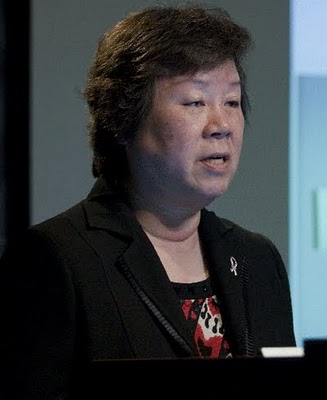
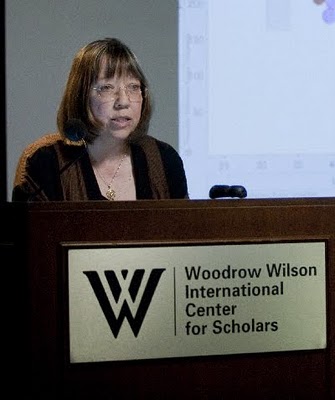
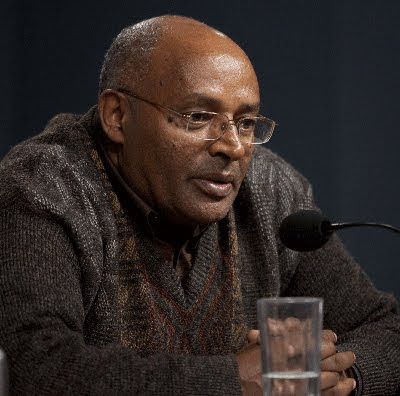




 “It’s not every day you find an issue where effective diplomacy and development will allow you to save millions of lives, feed the hungry, empower women, advance our national security interests, protect the environment, and demonstrate to billions of people that the United States cares. Water is that issue,” declared Secretary of State Hillary Clinton at a
“It’s not every day you find an issue where effective diplomacy and development will allow you to save millions of lives, feed the hungry, empower women, advance our national security interests, protect the environment, and demonstrate to billions of people that the United States cares. Water is that issue,” declared Secretary of State Hillary Clinton at a 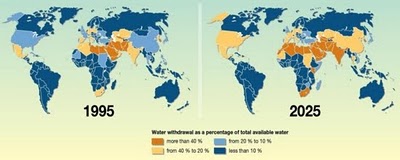
 Putting Women and Health First
Putting Women and Health First